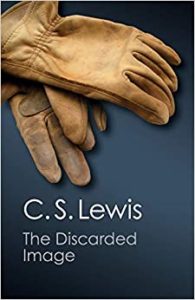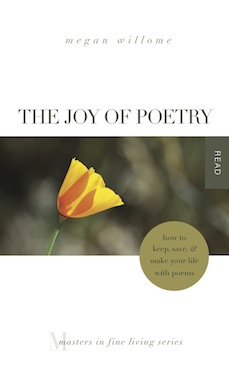A New Perspective Glass
Once upon a time, back in the 19th century, people found entertainment by looking through a perspective glass. This device allowed the viewer to look at a painting and feel the perspective shift, as if they were standing inside it. (Think of it as the video game of the Victorian era.) The desire to shift our perspective goes way back.
Ever since I read Kristin Lavransdatter, I’ve been fascinated with all things Medieval. That quest led me to C.S. Lewis’ final book, The Discarded Image, about the literature of Medieval and Renaissance people. It’s a joy-filled tour of their worldview, with Lewis as our guide, asserting that neither they nor we are right, but that our perspectives are vastly different.
Let’s take the example of maps. We think the purpose of a map is to show us precisely where things are. In contrast, a map from the 13th century would be less concerned with geography than with the romance of travel. So if a Medieval mapmaker put an island way out east and labeled it Paradise, that would be fine and dandy. Map-readers would not necessarily take that isle as the actual location of Paradise. As Lewis writes, “Sailors themselves may have looked at it with admiration and delight. They were not going to steer by it.”
That tells me the perspective of Medieval people is not only different from mine, but it has different values from mine. In this case, beauty over utility.
And don’t we value things that might have baffled an earlier generation?
Imagine trying to explain memes to your great-grandparent. I can imagine myself sitting on the floor beside my great-grandmother, perched on her La-Z-Boy, covered with a blanket up to her chin, even in August in South Texas. Granny, I’d say, take this photograph and imagine it has a few words written on it, like a postcard. But there’s a way to share this image with lots and lots of people. And then its one story becomes a way for all of us to tell our stories. She would probably grumble something indistinct. While beside me, a young cousin would grab her mother’s phone and make a meme that lives eternally and makes no sense whatsoever to middle-aged me.
Like love, perspective is a many-splendored thing. And reading allows us to live inside perspectives we never imagined.
This type of reading goes beyond reading an author whose background or identity is different from our own. We can go so much farther than that. We can hold ideas in our hands and juggle them, try on every nuance of the color blue. We can immerse ourselves in a perspective using a book as our perspective glass.
Will you join us? Our theme for 2022 is Perspective, and so this year we will make the Reading column our very own perspective glass. Expect to be surprised.
Your Turn
1. What is a book that you know would stretch your perspective? Put it on the top of this year’s stack.
2. What is a book that forever changed your perspective?
3. Share your December pages. Sliced, started, and abandoned are all fair game.
December’s Pages
Poetry
A Murmur in the Trees: poems by Emily Dickinson, edited and illustrated by Ferris Cook (checked this one out of the library and then bought my own copy)
Picture Books and Early Readers
The Stable Rat and Other Christmas Poems, by Julia Cunningham, illus. Anita Lobel
Growing Together, by Carmen Agra Deedy, illus. David Diaz
A Hippopotamusn’t, by J. Patrick Lewis, illus. Victoria Chess (children’s poetry, obviously)
The Sea of Tranquillity, by Mark Haddon
Middle Grade and YA
Homesick: My Own Story, by Jean Fritz, illus. Margot Tomes (Newbery Honor, memoir)
The Glorious Impossible, by Madeleine L’Engle, illus. with frescoes by Giotto (Medieval artist)
Anne of Green Gables, by L.M. Montgomery (Join us Friday, January 14 for Children’s Book Club!)
The Best Christmas Pageant Ever, by Barbara Robinson (annual re-read)
Grownups
A Christmas Carol, by Charles Dickens (annual re-read)
The Haunted Man, by Charles Dickens (a Christmas short story)
I, Cthulu, by Neil Gaiman (short story)
The Discarded Image, by C.S. Lewis
Prayer in the Night, by Tish Harrison Warren
Made Progress
The Divine Comedy, by Dante Alighieri, trans. Henry Wadsworth Longfellow (finished Inferno before Christmas)
Photo by DaiLuo, Creative Commons, via Flickr. Post by Megan Willome.
Browse Reading as Perspective Glass
I loved this book. As soon as I finished, I began reading it again.”
—David Lee Garrison, author of Playing Bach in the D. C. Metro
- Perspective: The Two, The Only: Calvin and Hobbes - December 16, 2022
- Children’s Book Club: A Very Haunted Christmas - December 9, 2022
- By Heart: ‘The night is darkening round me’ by Emily Brontë - December 2, 2022



Glynn says
Petrarch, lamenting what he thought was a lack of literature and culture during the period, was the first to call it the “Dark Ages.” His view is now largely considered incorrect and his Renaissance perspective rather narrow. (We’re different, of course; we have the internet, and look how wise and perceptive it’s made us compared to earlier generations.)
Some of the books that changed my perspective (in different ways and for different reasons): The War of the End of the World and Conversation in the Cathedral by Mario Vargas Llosa; the writings of the Ante-Nicene father Tertullian; Dickens, the biography by Peter Ackroyd; and The Gulag Archipelago by Solzhenitsyn.
December reading:
Non-fiction
Nicholas Mae: Dutch Master of the Golden Age (exhibition catalog by the National Gallery, London)
The Viking Heart by Arthur Herman (and my perspective changed!)
Breaking News: The Remaking of Journalism and Why It Matters Now by Alan Rusbridger
Old Christmas by Washington Irving
The Dying Citizen by Victor Davis Hanson
Shakespeare Project (and we’re finished! All of Shakespeare in a year!)
The Winter’s Tale
The Tempest
The Two Noble Kinsmen (with John Fletcher)
The Phoenix and the Turtle and The Funeral Elegy
Faith
Expository Thoughts on the Gospel of Luke by J.C. Ryle
Mystery
A Death in the Promised Land by Lawrence Epstein
The Mystery of Mistletoe Hall by Benedict Brown
Dark Project by Glenn McGoldrick (short story)
The Woods Murder by Roy Lewis
His Third Victim by Helen Durrant
Poetry
Too Many Seeds by Gabrielle Myers
Places the Soul Goes by Daniel Leach
Sir Gawain and the Green Knight, translated by J.R.R. Tolkien
Sir Gawain and the Green Knight, translated by Bernard O’Donoghue
Sir Gawain and the Green Knight, translated by Marie Borroff
Fiction
To Be Read at Dusk by Charles Dickens (ghost stories)
The Miracle of Mistletoe by Emily Dane Bortous
The Three Christmases of William Spencer by Derek Blount
Wildwood Lodge by Jennifer Griffin
Dancing King and Dancing Prince by yours truly (rereading my own stuff)
The Shivering Ground and Other Stories by Sara Barkat
What Child is This by Rhys Bowen
Children’s
St. Nicholas the Giftgiver by Ned Bustard
Megan Willome says
Congrats on finishing the Shakespeare project! I am sure that will reap fruits that will be revealed later. And I’m happy to see Dickens on your list of perspective-changers.
Yes, it’s easy for us to think that we are living in the most enlightened time. I think it takes at least 100 years before anything is clear–more like 500.
I may have to check out that Viking book!
L.L. Barkat says
I loved this, Megan. (Sara did, too. I read it aloud to her, and now she wants to learn more about perspective glass. 🙂 )
Why is it I have never, ever heard of that Lewis book? How surprising. 🙂 It sounds like an interesting read.
Megan Willome says
I heard about it on a podcast, and it was my first time as well. I think it was his last book. It reads like a university lecture, as if we got the Medieval Thoughts unit.